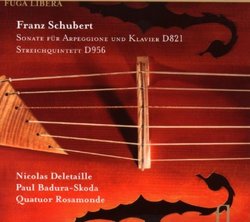High Expectations, Poor Results
Stephen Grabow | Lawrence, Kansas | 07/26/2008
(2 out of 5 stars)
"My standard of performance for Schubert's Sonata D.821 played on an actual arpeggione was the beautiful 1974 LP recording on DG Archiv by Klaus Storck accompanied by Alfons Kontarsky using early 19th century period instruments from the Berlin Instrument Museum. The arpeggione has a haunting sound and, once heard, it is hard to accept subsequent versions played on the cello. It was therefore with high expectations that I acquired this new CD version by Nicholas Deletaille playing a newly-built version of an actual arpeggione (a cross between a guitar and cello, played with a bow) accompanied by the great Paul Badura-Skoda on an 1820 pianoforte. Firstly, the tone of Deletaille's instrument is slightly astringent compared to Stork's. Second, the performance is marred by an incredibly distracting rasping sound that seems to be either Deletaille's breathing or the scraping of his sleeve which, in any case, has been picked up very loudly by the microphone and it evident right from the get-go. Third, the two instruments do not blend as well as in the Storck-Kontarsky combination and, at times, the usually well-informed and articulate Badura-Skoda seems too percussive on the pianoforte. Finally, both players seem to struggle at various times keeping up with each other. In the other work -- the great String Quintet -- Deletaille plays a regular cello with the slightly scratchy-sounding Rosamunde Quartet in an otherwise fine performance with an exceptionally well-played adagio. If, after all these reservations, one still wishes to purchase this CD, be warned that it comes in a cardboard folder rather than a regular jewel-case."
An outstanding performance
Nikos A. Salingaros | San Antonio, TX USA | 12/26/2009
(5 out of 5 stars)
"This is an outstanding performance of two wonderful works by Franz Schubert.
For the Arpeggione Sonata, Nicolas Deletaille uses a newly-built arpeggione instrument to obtain the unique sound and timbre that is very different from a regular cello (of which he is a contemporary master: see Deletaille's incredible recordings of the Bach Suites and the Beethoven Cello Sonatas). I disagree with another reviewer who brings up an out-of-print 1974 recording by Klaus Storck and Alfons Kontarsky to compare to this one (and does not mention a more recent 2006 recording by Gerhart Darmstadt and Egino Klepper). Every recording has its own validity, and the marketplace is not exactly awash with authentic recordings of this small masterpiece. Furthermore, any recent project that is fortunate enough to enlist the collaboration of the legendary Schubertian Paul Badura-Skoda -- still in top form as an octogenarian -- is to be treasured.
Now, the great String Quintet here gets one of its finest modern readings. Deletaille plays an 1865 Nicolas François Vuillaume cello in an admirable collaboration with the Rosamonde Quartet. Their interpretation is warm, poignant, and powerful at the proper moments, and the recorded sound is splendid. I totally concur with music reviewer William Norris who, writing in [...], describes the "filler" on this CD as arguably the main piece: "The sense of ensemble is palpable throughout, spawning endless moments of admiration. Listen out for the probing desperation of the third movement's Trio, and the magical, distant reminisces of the opening movement in the final Allegretto. An account of such poignancy and depth - aided by a warm, glowing sound."
By the way, the major independent classical labels in Europe now use a high-class cardboard and plastic case with inserted booklet (e.g. Accent, Bayer, Channel Classics, Harmonia Mundi, Lyrinx, Zig-zag Territoires), just like Fuga Libera does for this recording."


 Track Listings (7) - Disc #1
Track Listings (7) - Disc #1